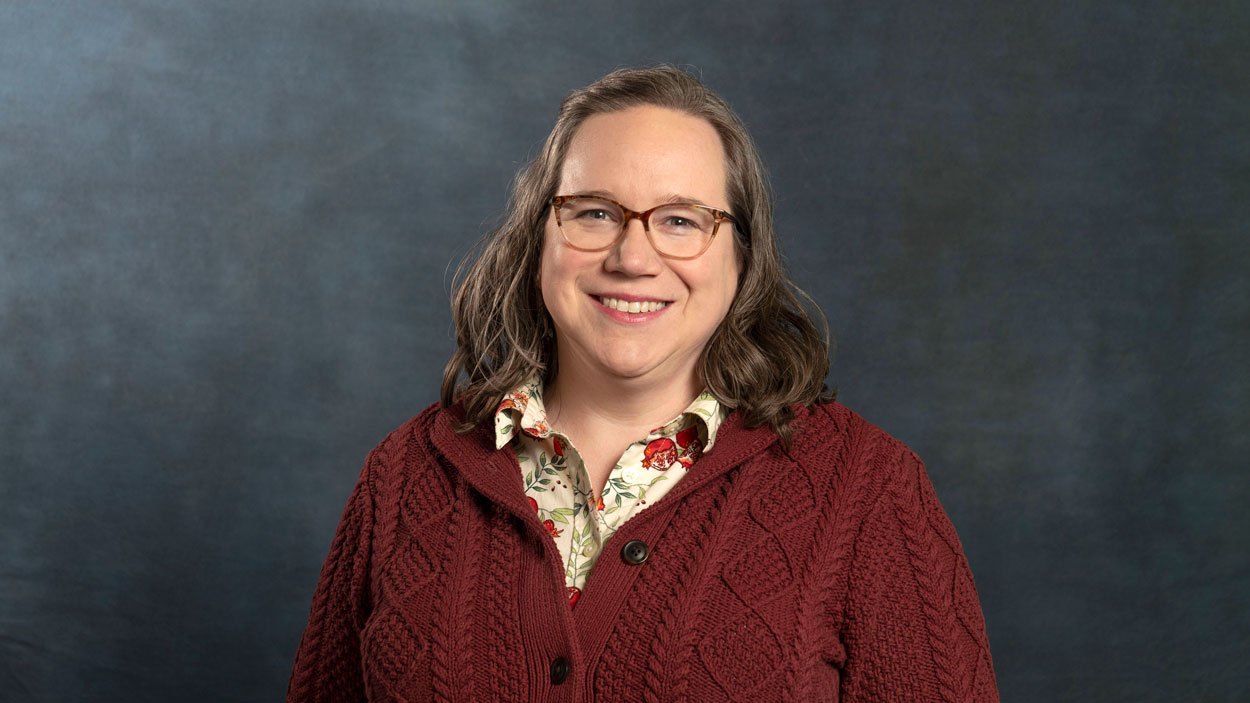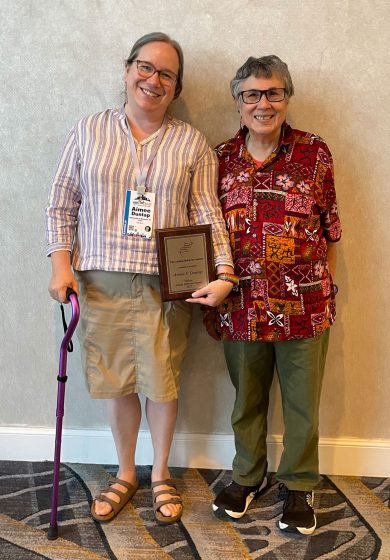
Professor Aimee Dunlap was elected a fellow of the Animal Behavior Society. She was honored at the organization’s annual meeting on Saturday in Baltimore. (Photo by Derik Holtmann)
Aimee Dunlap still has vivid memories of attending her first Animal Behavior Society Annual Meeting 25 years ago.
Dunlap had recently graduated from the University of Memphis as a triple major in biology, history and English and presented research on the effects of multiple mating, litter size and pregnancy rate in the prairie vole during the multiday event held that year at Morehouse College in Atlanta.
Dunlap, now a professor of biology at the University of Missouri–St. Louis, has been back to the annual meeting many times and has given more than a dozen other presentations, often related to her ongoing research on the foraging behavior and decision-making of bumblebees and other arthropods.

UMSL Professor Aimee Dunlap celebrated her election as a fellow of the Animal Behavior Society with longtime colleague Zuleyma Tang-Martinez, professor emerita in the Department of Biology, at the ABS Annual Meeting on Saturday in Baltimore. Tang-Martinez, who was elected an ABS fellow in 2011, was attending her 49th consecutive annual meeting. (Photo courtesy of Aimee Dunlap)
But it still felt a little surreal to make the trip to this year’s meeting in Baltimore knowing that she’d be officially welcomed as an ABS Fellow.
“All my heroes were all fellows,” said Dunlap, who was honored with four other newly elected fellows at a banquet Saturday night at the conclusion of the conference. “When I look at the list of fellows, it’s an impressive list of people, and many of them are people that I deeply admire for the kinds of research and the kinds of careers that they’ve had, so that means a lot.”
Members of the Animal Behavior Society come from all over the world, though the majority reside in the Western Hemisphere. Fewer than 10% are chosen for election as fellows. They must be engaged in research of animal behavior for at least 10 years and have made distinguished contributions to the field, not only through their research but also teaching and community service.
Dunlap is the third person to be elected from UMSL’s Department of Biology, following retired professors Patricia Parker and Zuleyma Tang-Martinez, who were named fellows in 2003 and 2011, respectively. UMSL’s first animal behaviorist, Marc Bekoff, was also elected a fellow later in his career while a faculty member at the University of Colorado.
She is happy to add to that legacy.
“I was actually excited to get this job at UMSL because of its reputation for being a great place for animal behavior,” said Dunlap, who came to the university as an assistant professor in 2012. “All of those conferences over all of those years, I would see these great talks by UMSL grad students. I met Zuleyma when I was an undergrad.”
It was Parker, meanwhile, who nominated Dunlap to be a fellow, and she noted the broad swath of Dunlap’s contributions in research, teaching and outreach.
“Her research is very different from mine, but they’re both in the general area of understanding how animals relate to their environments,” said Parker, a noted ornithologist known for studying avian malaria. “In her case, it’s about cognition and how animals make decisions. How does a bee decide what flower to go to, and do they keep going to the same one? Or if its supply starts to dwindle, where is the point that it decides to go to a different flower? She thinks about decision-making.”
Dunlap has authored three dozen peer-reviewed articles with several more currently under review.
Since 2022, Dunlap has been leading a team of researchers from across the St. Louis region studying urban agriculture, particularly ways to maximize pollination in urban orchards, with support of a $633,000 grant from the National Institute of Food and Agriculture.
Dunlap has been a favorite teacher at UMSL throughout her time in the Department of Biology.
“When we hired her, she started teaching animal behavior right away, and took it from a routine elective to among the most popular courses in the curriculum,” Parker said. “She’s just really enthusiastic about it, and her approach to teaching is electrifying. The students who go through her classes then want to be involved in research. They want to know more. So, I think her effectiveness in teaching and these new courses that she developed in the area of animal behavior are really remarkable.”
In 2017, she received the Emerson Excellence in Teaching Award. Two years later, she was named the recipient of the Excellence in Teaching Award from the UMSL Chapter of the National Society of Leadership and Success. In 2022, Dunlap received the Chancellor’s Award for Excellence in Teaching to a Tenured or Tenure Track Faculty Member. Last year, she received the Governor’s Award for Excellence in Teaching.
Dunlap is also committed to outreach and service that extends beyond the UMSL campus. She has spent the past three years as the interim co-director of UMSL’s Whitney R. Harris World Ecology Center and recently accepted a four-year term as its permanent director beginning this fall. In addition to supporting students training in ecology and biodiversity conservation, the center works to build public awareness and interest in issues relating to global natural resource conservation.
Dunlap has also been partnering with The Green House Venture and has led educational programs for area elementary school students at its Embankment Greenway along I-44 in south St. Louis.
“When you look at all those pieces together in one person, it really is exceptional,” Parker said. “I don’t think anybody does those things for the recognition. You do them because you’re compelled to do that for whatever reason, but then when the recognition comes and your colleagues from around the world say, ‘Oh yes, she is a fellow,’ then it feels wonderful.”














